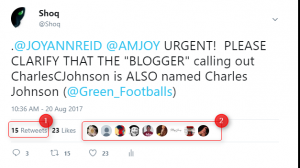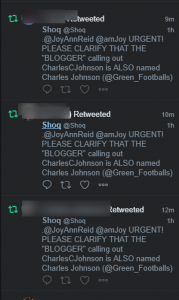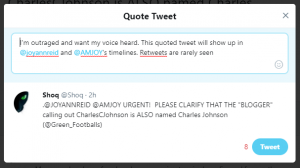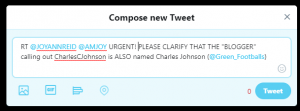To begin, an apology…
I've been meaning to post this for years. I apologize for only discussing it on Twitter before now. It's actually a very important thing to know, and most don't know it, and tips merely tweeted are usually lost in the clutter and noise of the Internet ether. That said, let's move on…
Your retweets are not seen as often as you may think.
Most now know that social media can have a dramatic impact on the news, and our reactions, once registered, can sometimes make an impact.
But one of the most common mistakes people make on Twitter is assuming that simply retweeting a tweet will somehow transmit their position or outrage to not only their own followers (which it will), but also to the @target person triggering the outrage, often @mentioned in a tweet or thread. But unfortunately, due to the way Twitter works, which most people still don't really understand very well, it won't. Unless their Retweet is the very first retweet, it is effectively invisible..
Why? Because RTs are only only seen ONCE (over about 24 hours). If not for that built-in throttling, @users — especially @celebrities — would be overwhelmed by thousands of RTs aimed at them every hour.
So, if yours is not the first retweet (which it rarely will be), it is simply added to the "retweet count" (see #1 below) for that tweet, and your avatar is added to its list of avatars retweeting it (#2). And even those are limited to the first 100 users retweeting it.

Since almost no one ever looks at that list of Retweeting avatars anyway (they aren't even visible in Tweetdeck and most other client Twitter programs), your "voice" is essentially unseen, and effectively unheard. Thus, below you see 3 people retweeting an urgent tweet of mine to a TV show host. Most think they are helping me amplify my appeal, assuming the @AmJoyShow or @joyannreid show will see their retweeted echo of my tweet. But as I've just explained, they won't.

So, how can your voice be heard?
It's very simple: just don't rely on simple retweets. When you want your take, co-sign, or outrage to register with a @target account, you have these two options:
-
"Quote/Comment" the tweet instead. That way, your @target will see an ORIGINAL tweet (yours), which can also include the tweet you are trying to amplify. For example:
dd

-
Copy and Paste into an original tweet. Adding the classic "RT" signal before your text is recommended, but optional. Your mention will be seen with or without it. Example:

As a bonus, a twofer! The visibility of your original tweet will be doubled when just one of your followers retweets it.
So there you have it
And if you're thinking, "Oh crap, thanks a pantload, Shoq. All those years of railing and flailing at people with my RTs, and only my own followers saw it? Did I really need to know this?"
I'm really sorry about that, but I'm only the messenger. And after years on Twitter, I'm pretty much bulletproof, so it just makes no sense to shoot me. Let's just move on. Remember this basic rule going forward:
If you want to be seen/heard, ALWAYS use a quoted tweet, or a simple copy and paste into a new tweet.
Related
Many of your @mentions may not be seen either: See: So What Does Dot (Period) Mean In Front of Some Twitter Replies (.@)
My other Twitter Tips: http://shoqvalue.com/twittertips
Please Share this Tip
Use this easy to remember short link: j.mpretweetwarning
Tweet